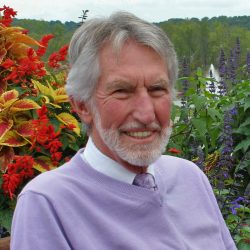ROBERT G. MYERS
Robert Gillespy Myers, a researcher in Comparative Education and the Economics of Education, has devoted most of his professional life to research, evaluation and the dissemination of information about practices, programs and policies intended to improve early childhood care and development (ECCD).
Early years and education. Born (September 2, 1934) to Horace and Jean Myers, Robert grew up and graduated from high school in the village of Le Roy, New York. He completed his B.A. in Economics at Oberlin College in 1956 and a Master of Arts in Teaching from Stanford University in 1962. His PhD. in Comparative Education (1972) is from the University of Chicago, Division of Social Sciences where his doctoral dissertation used an economic decision model to examine the relationship between a decision by foreign nationals to study in a United States university and their decision to return home after study or to emigrate, becoming part of the “brain drain.”
Early Professional Career (1956-1972). Prior to receiving his doctoral degree in 1967, Myers worked briefly as an Admissions Counselor (1956-57) and Assistant to the Dean of Men (59-61), both at Oberlin College. He served two years in the US Army (1957-59). He taught at the secondary school level in San Francisco (1961-2) and the American School in Lima, Peru (1962-64). Upon receiving his doctorate (1967), Myers was hired as an Assistant Professor in the Comparative Education Center of the University of Chicago (1967 to 1971). During the Chicago years, Myers focused his attention on problems related to education and emigration associated with study abroad as well as on education and labor force participation in Latin America.
Mid-Career (1972-1992). In 1972, Myers moved to the Ford Foundation as an education program officer in the Latin American Office (1972- 83), working from New York (1972-76; 1982-83) and Bogotá Colombia (1979-81). From 1976 to 1978 he was seconded by Ford to the International Development Research Centre (IDRC) in Ottawa Canada where he coordinated the Research Review and Advisory Group. That Group was charged with reviewing and making recommendations about how to strengthen educational research and research capacity in the so-called Third World.
While at the Ford Foundation, Myers was asked as part of his regular work to monitor several grants to organizations in Latin America examining the relationship between nutritional status and early childhood development. This experience convinced him he should reorient his career toward early childhood. In 1984 he was provided the opportunity to do so by David Weikart, Director of the High/Scope Educational Research Foundation. From that administrative base and collaborating closely with UNICEF and other international organizations (which, up to that time had shown little interest in financing Early Childhood Development), he founded and coordinated the Consultative Group on Early Childhood Care and Development (1984-1996), constructing over time an international network of concerned organizations and individuals in more than 60 countries. The network became a mechanism for producing, gathering, synthesizing and disseminating information about ECCD with the intention of informing and improving policy-making and programming affecting young children’s´ lives, particularly those children living in difficult circumstances in the so-called Third World. Among other things, these efforts led to incorporating early childhood as part of the international commitment made to a program of Education for All established in 1990 in Jomtien, Thailand. Over time, it helped to increase international funding available for ECCD. Also, in 1990, and as a contribution to discussions surrounding The Convention of the Rights of Children, Myers wrote a book titled Toward a Fair Start for Children. This was followed in 1992 by a frequently-cited book presenting a more extensive analysis of early childhood development programming, titled The Twelve Who Survive — Strengthening Programmes of Early Childhood Development in the Third World.
Later-Career (1996 — ). Since 1996, Myers has continued his ECD work as researcher, evaluator and advocate from a base in two non-governmental organizations in Mexico: El Colectivo Mexicano de Apoyo a la Niñez (1996 – 2000) and Hacia una Cultura Democrática (2001 -2020). During this period, emphasis has been placed on defining, evaluating and improving the quality of child care and preschool programs.
Since 1987, Myers has lived in Mexico where he is currently a permanent resident.

